DEMURRAGE-主文
免堆期和免用箱期
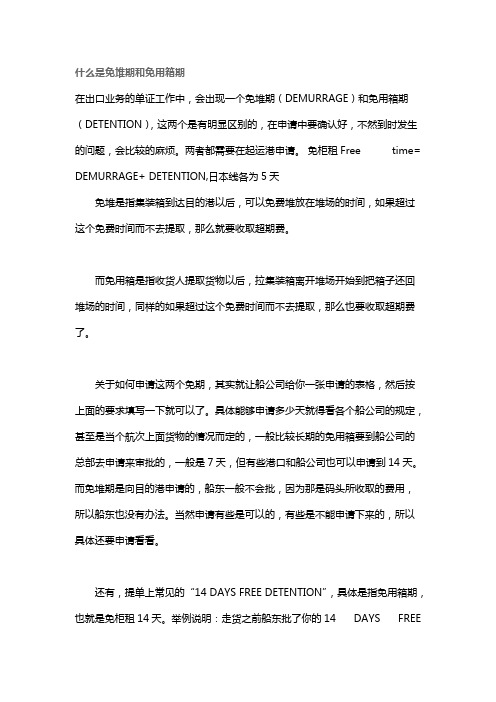
什么是免堆期和免用箱期在出口业务的单证工作中,会出现一个免堆期(DEMURRAGE)和免用箱期(DETENTION),这两个是有明显区别的,在申请中要确认好,不然到时发生的问题,会比较的麻烦。
两者都需要在起运港申请。
免柜租Free time= DEMURRAGE+ DETENTION,日本线各为5天免堆是指集装箱到达目的港以后,可以免费堆放在堆场的时间,如果超过这个免费时间而不去提取,那么就要收取超期费。
而免用箱是指收货人提取货物以后,拉集装箱离开堆场开始到把箱子还回堆场的时间,同样的如果超过这个免费时间而不去提取,那么也要收取超期费了。
关于如何申请这两个免期,其实就让船公司给你一张申请的表格,然后按上面的要求填写一下就可以了。
具体能够申请多少天就得看各个船公司的规定,甚至是当个航次上面货物的情况而定的,一般比较长期的免用箱要到船公司的总部去申请来审批的,一般是7天,但有些港口和船公司也可以申请到14天。
而免堆期是向目的港申请的,船东一般不会批,因为那是码头所收取的费用,所以船东也没有办法。
当然申请有些是可以的,有些是不能申请下来的,所以具体还要申请看看。
还有,提单上常见的“14 DAYS FREE DETENTION”,具体是指免用箱期,也就是免柜租14天。
举例说明:走货之前船东批了你的14 DAYS FREEDETENTION,等货到达目的港(如堆场规定堆期是五天),你可能在第十天来提货,但只要你在后4天内能完成卸货任务,把柜子还回堆扬,.船公司就不会收取柜租了,但那超过五天的码头堆存费还是要收。
再介绍下为什么很多时候客户会选择MAERSK的船,那是因为像MAERSK这样老大级的船公司在世界各个地方都有自己的码头,即使MAERSK价格偏高,但码头是它的也就是免堆期可以容易申请,也就是这个道理了。
最后,大家在走货之前,一定得向船东申请免用箱期,批不批那不是自己的问题,但必须去申请,而且如果客户说要申请免堆期,最好跟他解释下,顺便确认下到底申请什么,因为免堆期即使超期了费用相对比较少,而船东收取的超免柜期才是金额大的,也是工作上需要担心的。
船公司及操作术语

船公司及操作术语船公司是指专门从事海上货物运输和船舶租赁服务的企业机构。
在全球海运业中,船公司是连接货物生产和消费地的重要环节,承担着海上货运的核心职责。
本文将介绍船公司的一些常见操作术语和相关内容。
1.船公司类型:-营运者船公司:这些公司拥有并经营自己的船舶。
他们可根据市场需求调度船舶,选择运输航线和货物。
-租船公司:租船公司只提供船舶的租赁服务,不经营海运。
他们将船舶出租给船公司或货主使用。
-转包公司:转包公司不拥有自己的船舶,业务主要是在船运业务与货主之间进行协调,将货物转包给货船承运。
2.船舶租赁术语:-船舶租赁合同:租赁船舶的双方达成的合同,包括租金、租船期限、租赁船舶的规格等内容。
- 租船期(Time Charter):指租船公司将船舶租给船东一段时间,船东支付一定租金。
- 船舶帮(Demurrage):指超出计划船期的装卸时间,船东向租船公司支付的额外费用。
- 驳船(Lighterage):将货物从大型船只转移到小型船只的操作。
- 叠潮(Stowage):将货物妥善放置在船舶的货舱内以确保安全运输。
3.货物运输操作术语:- 散货(Bulk Cargo):无装载设备,通过散装的方式装载、卸载的货物,如煤炭、矿石等。
- 集装箱(Container):标准化货物运输容器,常用于集装箱船运输货物。
- 滚装货物(Roll-on/Roll-off):非集装箱货物,通过车辆自行驶入船舶进行装卸的操作,如汽车、工程机械等。
- 冷藏船(Reefer Ship):专门用于运输冷冻货物的船舶,具备保持低温的设备。
- 液体货物(Liquid Cargo):以液体形式运输的货物,如汽油、原油等。
- 散装货物(Break Bulk Cargo):指无固定装载设备的散装货物,需要逐件装卸的货物。
4.船公司运营管理术语:- 排期计划(Scheduling Plan):安排船舶的出港和到港时间,确保货物按时到达目的地。
外贸单证实务习题答案
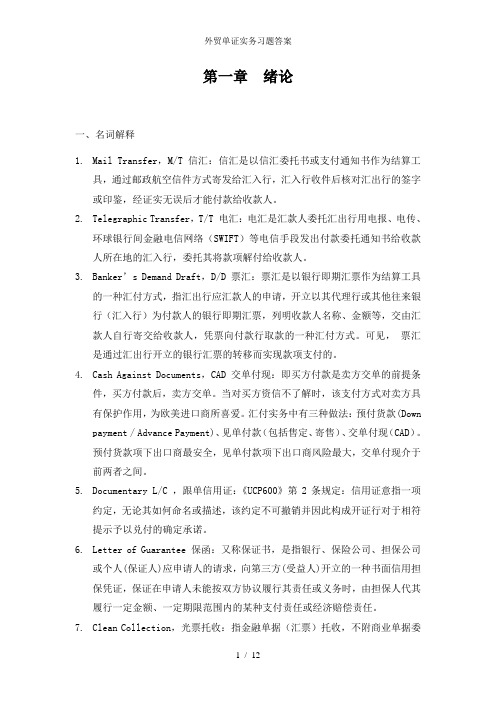
第一章绪论一、名词解释1.Mail Transfer,M/T 信汇:信汇是以信汇委托书或支付通知书作为结算工具,通过邮政航空信件方式寄发给汇入行,汇入行收件后核对汇出行的签字或印鉴,经证实无误后才能付款给收款人。
2.Telegraphic Transfer,T/T 电汇:电汇是汇款人委托汇出行用电报、电传、环球银行间金融电信网络(SWIFT)等电信手段发出付款委托通知书给收款人所在地的汇入行,委托其将款项解付给收款人。
3.Banker’s Demand Draft,D/D 票汇:票汇是以银行即期汇票作为结算工具的一种汇付方式,指汇出行应汇款人的申请,开立以其代理行或其他往来银行(汇入行)为付款人的银行即期汇票,列明收款人名称、金额等,交由汇款人自行寄交给收款人,凭票向付款行取款的一种汇付方式。
可见,票汇是通过汇出行开立的银行汇票的转移而实现款项支付的。
4.Cash Against Documents,CAD 交单付现:即买方付款是卖方交单的前提条件,买方付款后,卖方交单。
当对买方资信不了解时,该支付方式对卖方具有保护作用,为欧美进口商所喜爱。
汇付实务中有三种做法:预付货款(Down payment / Advance Payment)、见单付款(包括售定、寄售)、交单付现(CAD)。
预付货款项下出口商最安全,见单付款项下出口商风险最大,交单付现介于前两者之间。
5.Documentary L/C ,跟单信用证:《UCP600》第2条规定:信用证意指一项约定,无论其如何命名或描述,该约定不可撤销并因此构成开证行对于相符提示予以兑付的确定承诺。
6.Letter of Guarantee 保函:又称保证书,是指银行、保险公司、担保公司或个人(保证人)应申请人的请求,向第三方(受益人)开立的一种书面信用担保凭证,保证在申请人未能按双方协议履行其责任或义务时,由担保人代其履行一定金额、一定期限范围内的某种支付责任或经济赔偿责任。
货代操作文件的常用英语

(一)船代Shipping agent 船舶代理Handling Agent 操作代理Booking Agent 订舱代理Cargo Canvassing 揽货FFF:Freight Forwarding Fee 货代佣金Brokerage / Commission 佣金(二)订舱Booking 订舱Booking Note 订舱单Booking Number 订舱号Dock Receipt 场站收据M/F (Manifest ) :a manifest that lists only cargo, without freight and charges 舱单Cable/Telex Release 电放A Circular Letter 通告信/通知书PIC:Person in Charge 具体负责操作人员The said party 所涉及的一方On Board B/L:On Board提单A B/L in which a carrier acknowledges that goods have been placed on board a certain vessel。
Used to satisfy the requirements of a L/C Cancellation 退关箱(三)港口BP Base Port 基本港Prompt release 即时放行Transit time 航程时间/ 中转时间Cargo availability at destination in 货物运抵目的地Second Carrier (第)二程船In transit 中转Transportation hub 中转港(四)拖车Tractor 牵引车/拖头Low-bed 低平板车Trailer 拖车Transporter 拖车Trucking Company 车队(汽车运输公司)Axle load 轴负荷Tire-load 轮胎负荷Toll Gate 收费口(五)保税Bonded Area 保税区Bonded Goods ( Goods in Bond) 保税货物Bonded Warehouse 保税库Caged stored at bonded warehouse 进入海关监管Fork Lift 叉车Loading Platform 装卸平台(六)船期A Friday(Tuesday / Thursday)sailing 周五班A fortnight sailing 双周班A bi-weekly sailing 周双班A monthly sailing 每月班On-schedule arrival / departure 准班抵离ETA :Estimated(Expected) Time of Arrival 预计到达时间ETB:Estimated(Expected)Time of Berthing 预计靠泊时间ETD Estimated(Expected) Time of Departure 预计离泊时间The sailing Schedule/Vessels are subject to change without prior notice。
ihf海运术语

ihf海运术语1. 介绍ihf海运术语是国际海运领域常用的一套术语,用于描述海运货物的运输和相关操作。
这些术语被广泛应用于国际贸易和物流领域,帮助各方沟通和理解海运运输过程中的各种环节和要求。
在本文中,我们将详细介绍一些ihf海运术语的含义和用法,以帮助读者更好地理解海运业务的相关术语和流程。
2. 主要术语2.1 FCL(Full Container Load)整柜运输FCL是指整柜运输,即一整个货柜由同一货主装载货物。
这种运输方式适用于货物数量较多、体积较大、重量较重的情况。
在FCL运输中,货物由货主自行装箱,并且整个货柜的运费由货主承担。
2.2 LCL(Less than Container Load)拼箱运输LCL是指拼箱运输,即将多个货主的货物装在同一个货柜中进行运输。
这种运输方式适用于货物数量较少、体积较小、重量较轻的情况。
在LCL运输中,货物由货主交给物流公司进行集货,并且运费按照货物的实际体积或重量进行计算。
2.3 CIF(Cost, Insurance and Freight)成本、保险和运费CIF是指成本、保险和运费,是国际贸易中常用的价格术语。
CIF价格包括了货物的成本、保险费和运费,卖方负责将货物交付到指定的目的港口,并承担货物的损失和损坏风险,直到货物抵达目的港口。
2.4 FOB(Free on Board)离岸价FOB是指离岸价,是国际贸易中常用的价格术语。
FOB价格包括了货物的成本和装运费用,卖方负责将货物交付到指定的起运港口,并承担货物的损失和损坏风险,直到货物装上船舶。
2.5 Bill of Lading(B/L)提单Bill of Lading是指提单,是一种海运货物的装运凭证。
提单是货主与船公司之间签订的合同,用于确认货物的收货和装运情况。
提单上详细记录了货物的数量、品名、运费等信息,是货物主人领取货物的凭证。
2.6 Container Yard(CY)集装箱堆场Container Yard是指集装箱堆场,用于存放和管理集装箱的场地。
集装箱货运操作相关专业术语名词解释
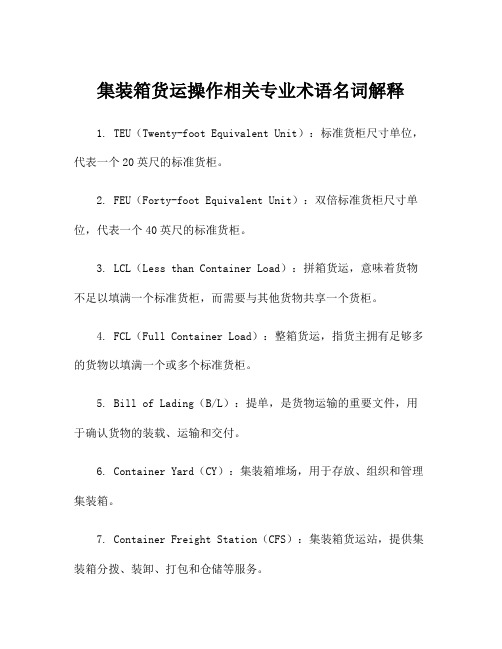
集装箱货运操作相关专业术语名词解释1. TEU(Twenty-foot Equivalent Unit):标准货柜尺寸单位,代表一个20英尺的标准货柜。
2. FEU(Forty-foot Equivalent Unit):双倍标准货柜尺寸单位,代表一个40英尺的标准货柜。
3. LCL(Less than Container Load):拼箱货运,意味着货物不足以填满一个标准货柜,而需要与其他货物共享一个货柜。
4. FCL(Full Container Load):整箱货运,指货主拥有足够多的货物以填满一个或多个标准货柜。
5. Bill of Lading(B/L):提单,是货物运输的重要文件,用于确认货物的装载、运输和交付。
6. Container Yard(CY):集装箱堆场,用于存放、组织和管理集装箱。
7. Container Freight Station(CFS):集装箱货运站,提供集装箱分拨、装卸、打包和仓储等服务。
8. Demurrage:滞期费,指货柜在堆场或港口停留时间超过规定的免费期限而产生的额外费用。
9. Detention:扣留费,指货主在规定时间内未能将货柜返回给船公司或货代,导致货柜被占用而产生的额外费用。
10. Customs Clearance:海关清关,指货物进出口过程中需要完成的海关手续和文件提交。
11. Inland Transportation:内陆运输,指货柜从装货港口到目的地的路上运输。
12. Reefer Container:冷藏货柜,用于运输需要保持低温或恒温的货物,如食品和药品。
13. Hazardous Cargo:危险品,指具有潜在危险性、需要特殊处理和运输的货物。
14. NVOCC(Non-Vessel Operating Common Carrier):非船舶承运人,指代表货主与船公司之间操作集装箱运输业务的中介机构。
15. Transshipment:中转,指将货物从一艘船转移到另一艘船上,而不是直接运输到目的地港口。
海运 撤载费英文

海运撤载费英文
(原创版)
目录
1.海运概述
2.撤载费的定义及英文表达
3.海运中的撤载费相关事项
4.撤载费的计算方式及常见问题
5.结论
正文
1.海运概述
海运,即海上运输,是指通过船舶在海上进行货物运输的一种方式。
相较于其他运输方式,海运具有运输量大、成本低的优势,因此在国际贸易中扮演着举足轻重的角色。
2.撤载费的定义及英文表达
撤载费(英文:Demurrage Charge),是指在海运过程中,由于货物未能在规定的时间内完成装卸,导致船舶产生延误,进而向货主收取的一种费用。
简单来说,撤载费是因为货物在船上的滞留时间超过预期而产生的额外费用。
3.海运中的撤载费相关事项
在海运合同中,通常会明确规定货物的装卸时间,以及在超过规定时间后需要支付撤载费的相关条款。
货主在签订合同时,需要仔细阅读合同内容,了解撤载费的收费标准及计算方式,以避免产生不必要的费用。
4.撤载费的计算方式及常见问题
撤载费的计算方式通常按照每天每吨或每立方米收取一定金额。
常见
的问题包括:如何计算滞留时间、如何界定责任方、如何避免产生撤载费等。
对于这些问题,货主和船方可以通过沟通协商,明确责任,确保货物的顺利运输。
5.结论
海运是国际贸易中重要的运输方式,而撤载费是海运过程中可能产生的额外费用。
海运 撤载费英文

海运撤载费英文摘要:1.海运的基本概念2.撤载费的定义和作用3.撤载费的计算方式和影响因素4.撤载费在国际贸易中的应用5.撤载费的英文表达方式正文:海运,即海上运输,是指利用船舶通过海上航线来运送货物和旅客的一种运输方式。
在国际贸易中,海运占据着重要的地位,因为它可以实现不同国家和地区之间的货物互通。
在海运过程中,涉及到许多费用,如运费、保险费、港口费等。
而撤载费(demurrage)也是其中之一,它是指由于某些原因导致货物在目的港口滞留,产生额外费用,需由货主承担的一种费用。
撤载费的定义和作用可以从以下几个方面来解释。
首先,撤载费是对货主的一种惩罚性措施,目的是为了促使货主尽快完成货物的清关和提货工作,避免港口拥堵和船舶滞留。
其次,撤载费也是船运公司的一种补偿性收入,当船舶在目的港口滞留时,船运公司需要支付一定的费用,如港口费、燃油费等。
因此,撤载费可以看作是船运公司转移成本的一种手段。
撤载费的计算方式和影响因素主要取决于不同的船运公司和贸易条款。
通常情况下,撤载费的计算方式是以天为单位,按照货物的吨位或立方米来计算。
影响撤载费的因素包括货物的滞留时间、目的港口的收费标准、船运公司的政策等。
撤载费在国际贸易中的应用十分广泛。
在国际贸易中,买卖双方通常会通过签订贸易合同来约定货物的运输、清关和付款等事宜。
在这些合同中,撤载费通常会被明确规定,以避免货主和船运公司之间的纠纷。
此外,撤载费也是货主和船运公司之间协商和谈判的重要议题之一。
最后,撤载费的英文表达方式是“demurrage”。
在国际贸易中,货主和船运公司通常会用这个词来表示撤载费。
例如,在签订贸易合同时,双方可能会约定:“In the event of demurrage, the buyer shall pay the seller the demurrage charges according to the agreement.”(如发生撤载费,买方应按照协议向卖方支付撤载费。
船务专有名词解释
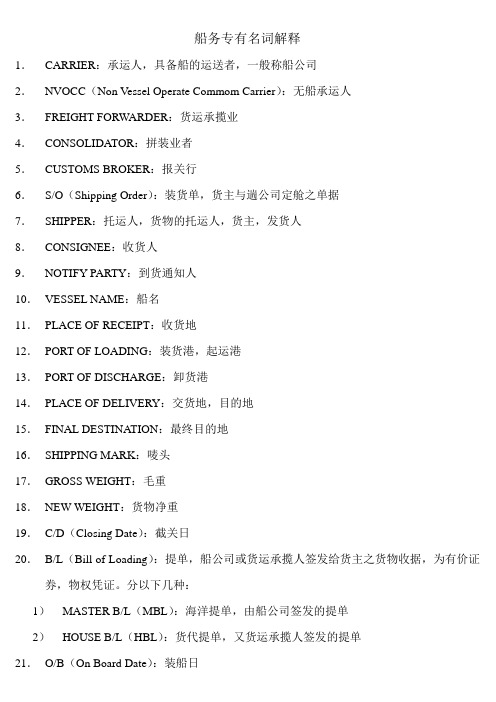
船务专有名词解释1.CARRIER:承运人,具备船的运送者,一般称船公司2.NVOCC(Non Vessel Operate Commom Carrier):无船承运人3.FREIGHT FORWARDER:货运承揽业4.CONSOLIDATOR:拼装业者5.CUSTOMS BROKER:报关行6.S/O(Shipping Order):装货单,货主与遄公司定舱之单据7.SHIPPER:托运人,货物的托运人,货主,发货人8.CONSIGNEE:收货人9.NOTIFY PARTY:到货通知人10.VESSEL NAME:船名11.PLACE OF RECEIPT:收货地12.PORT OF LOADING:装货港,起运港13.PORT OF DISCHARGE:卸货港14.PLACE OF DELIVERY:交货地,目的地15.FINAL DESTINATION:最终目的地16.SHIPPING MARK:唛头17.GROSS WEIGHT:毛重18.NEW WEIGHT:货物净重19.C/D(Closing Date):截关日20.B/L(Bill of Loading):提单,船公司或货运承揽人签发给货主之货物收据,为有价证券,物权凭证。
分以下几种:1)MASTER B/L(MBL):海洋提单,由船公司签发的提单2)HOUSE B/L(HBL):货代提单,又货运承揽人签发的提单21.O/B(On Board Date):装船日22.ETD(Estimated Time of Departure):预计开航日23.ETA(Estimated Time of Arrival):预计到达日24.CY(Container Yard):货柜集散地,引申为整柜货之意25.FCL(Full Container Load):整柜,即CY26.CFS(Container Freight Station):拼装货集散地,引申为拼柜货之意27.LCL(Less Container Load):拼柜,即CFS28.A/W(All Water):全水路,主要指货经巴拿马运河至美国东岸29.AMS(AMERICA Manifest System):美国舱单系统,2003年美因“反恐”的需要,规定CARRIER必须于SAILING TIME 前24HOURS将货物资料通过AMS系统申报给美国海关,而FORW ARDER则必须于SAILING TIME 48HOURS前将资料报给CARRIER(文件的CUT OFF TIME比SAILING TIME 早48HOURS),此文件发送,需要向SHPR收AMS费用,通常为USD25/BILL。
船舶词汇
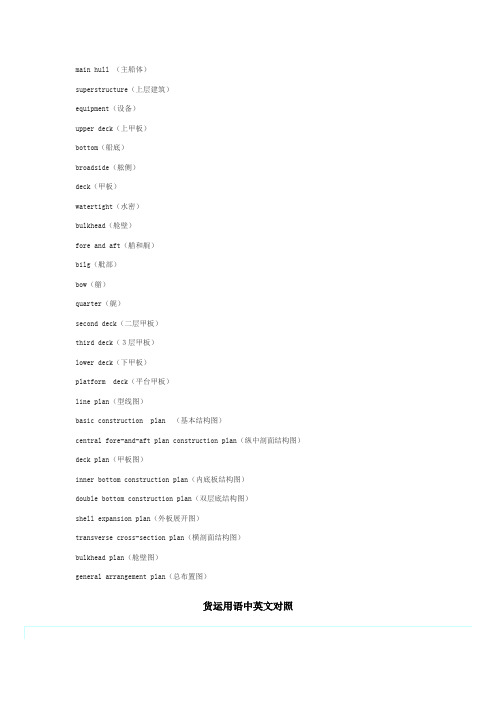
运费carriage charges | | shipping expenses | | express charges
车费cartage | | portage
运费预付carriage prepaid | | carriage paid
大副收据mate's receipt
装船单shipping order
提货单delivery order
装船通知shipping advice
包裹收据parcel receipt
准装货单shipping permit
租船契约charter party
租船人charterer
程租船||航次租赁voyage charter
装运shipment | | loading
装上货轮to ship | | to load | | to take on a ship
装运费shipping charges | | shipping commission
装运单||载货单shipping invoice
装运单据shipping documents
货轮cargo boat | | freighter | | cargo steamer | | cargo carrier
火车goods-train | | freight-train
卡车goods-van | | goods wagon | | freight car | | truck
货运办公室goods-office | | freight-department
quarter(艉)
second deck(二层甲板)
物流专业术语和常用术语
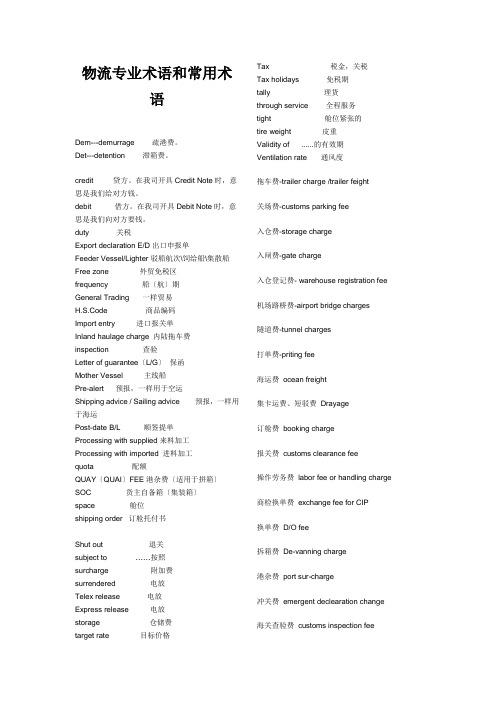
物流专业术语和常用术语Dem---demurrage 疏港费。
Det---detention 滞箱费。
credit 贷方。
在我司开具Credit Note时,意思是我们给对方钱。
debit 借方。
在我司开具Debit Note时,意思是我们向对方要钱。
duty 关税Export declaration E/D出口申报单Feeder Vessel/Lighter 驳船航次\饲给船\集散船Free zone 外贸免税区frequency 船〔航〕期General Trading 一样贸易H.S.Code 商品编码Import entry 进口报关单Inland haulage charge 内陆拖车费inspection 查验Letter of guarantee〔L/G〕保函Mother Vessel 主线船Pre-alert 预报,一样用于空运Shipping advice / Sailing advice 预报,一样用于海运Post-date B/L 顺签提单Processing with supplied 来料加工Processing with imported 进料加工quota 配额QUAY〔QUAI〕FEE港杂费〔适用于拼箱〕SOC 货主自备箱〔集装箱〕space 舱位shipping order 订舱托付书Shut out 退关subject to ……按照surcharge 附加费surrendered 电放Telex release 电放Express release 电放storage 仓储费target rate 目标价格Tax 税金,关税Tax holidays 免税期tally 理货through service 全程服务tight 舱位紧张的tire weight 皮重Validity of ......的有效期Ventilation rate 通风度拖车费-trailer charge /trailer feight关场费-customs parking fee入仓费-storage charge入闸费-gate charge入仓登记费- warehouse registration fee 机场路桥费-airport bridge charges隧道费-tunnel charges打单费-priting fee海运费ocean freight集卡运费、短驳费Drayage订舱费booking charge报关费customs clearance fee操作劳务费labor fee or handling charge 商检换单费exchange fee for CIP换单费D/O fee拆箱费De-vanning charge港杂费port sur-charge冲关费emergent declearation change 海关查验费customs inspection fee待时费waiting charge仓储费storage fee改单费amendment charge拼箱服务费LCL service charge动、植检疫费animal & plant quarantine fee进出库费warehouse in/out charge提箱费container stuffing charge滞期费demurrage charge滞箱费container detention charge卡车运费cartage fee转运费transportation charge污箱费container dirtyness change坏箱费用container damage charge清洁箱费container clearance charge分拨费dispatch charge车内交货FOT ( free on track )电汇手续费T/T fee上海港常用术语内装箱费container loading charge(including inland drayage)疏港费port congestion charge他港常用术语场站费CFS charge文件费document charge BAF BUNKER AJUSTMENT FACTOR 燃油附加费CAF CURRENCY AJUSTMENT FACTOR 币值附加费FAF Fuel AdjustmentFactor 燃油价调整附加费〔日本航线专用〕IPI INTERIOR POINT INTERMODAL 内陆转运费??PSS Peak Season Sucharges 旺季附加费大多数航线在运输旺季时可能临时使用Fumigation Charge 熏蒸费Ice Surcharge 冰冻附加费集卡运费、短驳费Drayage待时费waiting charge滞期费demurrage charge滞箱费container detention charge卡车运费cartage fee到货通知费delivery order fee清洁箱费container clearance charge分拨费dispatch charge车内交货FOT ( free on track )各航线费用组成美西O/F+PSS+AMS+WRS+IAC+IPI+ERS+ACC美东O/F+PSS+AMS+WRS+PCC+RIPI+ERS东南亚线O/F+BAF+WRS+PCS欧洲O/F+BAF+CAF+PSS(旺季时候会加〕日本O/F+PSS (EBS+BAF/YAS+CYC一样到付〕韩国O/F+PSS+EBS所谓附加费,确实是差不多运费以外的,由于在专门情形下或者临时发生某些事件的情形下而加收的费用。
海商法 字母

海商法字母海商法是指海商领域内的法律法规。
以下是一些海商法中的常见字母以及它们的解释:A:Auxiliary vessel,即辅助船舶,指辅助商船进行装卸、维修等工作的船只。
B:Bill of lading,即提单,是一种由船公司、承运人或代理人签发的、载明货物数量、品质、规格、承运人的名称及载运标准的运输凭证。
C:Collision,即船舶碰撞,是指两艘或以上船只相撞的事件。
D:Demurrage,即滞期费,是指由于货物在港口滞留所引起的费用。
E:Exclusive economic zone,即专属经济区,是指一个国家掌控其中生物、资源、油气的经济区域。
F:Freight,即运费,是指货物运输所需支付的费用。
G:General average,即共同海损,是指在船舶上运输过程中为保证货物和船舶的安全而做出的共同决策,并由所有货主按照各自的货物价值所承担的损失。
H:Hague-Visby Rules,即海牙-维斯比公约,是国际上规范海上货物运输的一份公约,规定了船舶承运人的义务及货主的权利和责任等事宜。
I:Inland waterway transportation,即内陆水路运输,是指以内陆河流和湖泊为通道的货物运输方式。
J:Jurisdiction,即管辖权,是指某一法院或国家对某一案件的审理权限。
K:Knot,即节,是船舶速度的单位,等于每小时航行的海里数。
L:Laytime,即装卸时间,是指船舶在港口内完成装卸货物所花费的时间。
M:Marine pollution,即海洋污染,是指在航运过程中因船舶运输、清洗、维修等行为所造成的对海洋环境的污染。
N:Navigable waters,即可航水域,是指能够通航的水域。
O:Oil pollution,即油污染,是指船舶运输中因石油泄漏而造成的环境破坏。
P:Port state control,即港口国检查,是指为保障港口安全、保护海洋环境而进行的对在港船舶的检查。
堆存费 demurrage 和滞箱费 的处罚

堆存费 demurrage 和滞箱费的处罚堆存费、demurrage和滞箱费是货物运输中的常见概念,它们是为了调节货物运输中的各种情况而设立的一种处罚制度。
在国际贸易和物流中,这些费用可能会对贸易双方的利益产生影响,因此有必要深入了解这些费用的含义、计算方式和应对措施。
在物流运输中,堆存费代表着货物在仓库堆放的费用。
货物因各种原因无法及时提走,就需要支付堆存费。
demurrage是指货物在装卸港口或货车上停留超过规定的免费时长后所产生的费用,这是由承运方所规定的。
滞箱费是指货柜在规定时间内未能退还给船公司或货柜拥有者所产生的费用。
这三种费用都属于货物滞留所产生的费用,通常会在货物运输合同中明确规定。
在国际贸易中,堆存费、demurrage和滞箱费的计算方式相对复杂。
具体计费标准和计费周期往往由各个航运公司或货代公司自行制定,也需要根据货物的性质、数量、运输方式等因素来确定。
在签订运输合双方需要认真了解并明确约定相关费用的计费标准和支付方式,以避免后期发生纠纷。
为了避免承担堆存费、demurrage和滞箱费,货主和货代公司需要采取一系列有效的措施。
货主需要合理规划运输时间,避免货物滞留或滞留时间过长。
货代公司需要提前进行货物清关以及相关手续办理,以确保货物能够按时提走。
货主和货代公司还可以通过货物跟踪系统等手段加强对货物运输状况的监控,及时发现问题并采取措施解决。
对于承运方而言,合理设定堆存费、demurrage和滞箱费的标准是非常重要的。
过高或过低的费用标准都会对货主和货代公司的利益产生影响。
在制定这些费用标准时,需要充分考虑货物运输的实际情况,避免给货主和货代公司带来过大的经济负担。
总结来说,堆存费、demurrage和滞箱费是货物运输过程中不可避免的费用,对于货主和货代公司而言,了解并合理应对这些费用至关重要。
双方需要在合同中明确约定相关费用的计费标准和支付方式,同时通过合理的运输规划和有效的监控手段来避免不必要的费用支出。
(英语毕业论文)论小说《德库拉》中的哥特元素
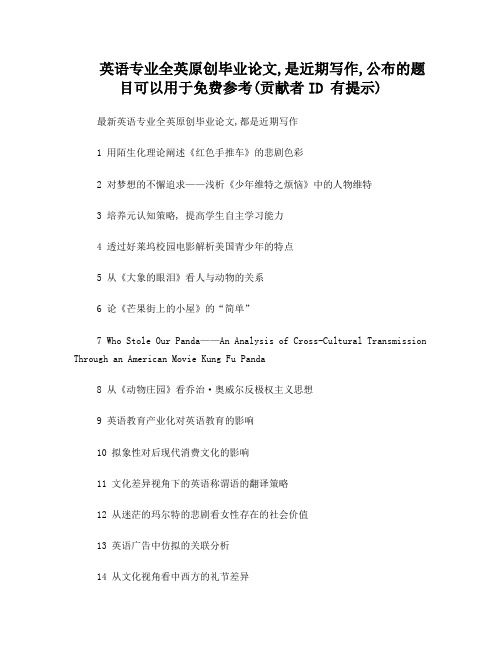
英语专业全英原创毕业论文,是近期写作,公布的题目可以用于免费参考(贡献者ID 有提示)最新英语专业全英原创毕业论文,都是近期写作1 用陌生化理论阐述《红色手推车》的悲剧色彩2 对梦想的不懈追求——浅析《少年维特之烦恼》中的人物维特3 培养元认知策略, 提高学生自主学习能力4 透过好莱坞校园电影解析美国青少年的特点5 从《大象的眼泪》看人与动物的关系6 论《芒果街上的小屋》的“简单”7 Who Stole Our Panda——An Analysis of Cross-Cultural Transmission Through an American Movie Kung Fu Panda8 从《动物庄园》看乔治·奥威尔反极权主义思想9 英语教育产业化对英语教育的影响10 拟象性对后现代消费文化的影响11 文化差异视角下的英语称谓语的翻译策略12 从迷茫的玛尔特的悲剧看女性存在的社会价值13 英语广告中仿拟的关联分析14 从文化视角看中西方的礼节差异15 A Comparative Study of English and Chinese Taboos in the Context of Intercultural Communication16 商务谈判口译的语用失误的成因及负面影响对学习的启示17 《日用家当》中的黑人文化意象分析18 初中英语课堂教师话语分析1920 The Impact of Gender Differences on Language Learning Strategies21 On the Characteristics of Desert Island Literature from Lord of the Flies22 《鲁滨逊漂流记》中鲁滨逊的资产阶级特征23 Euphemism in English advertisements24 Application of Cooperative Principles in the Study ofIntercultural Business Negotiation25 The Painful Growth of Scarlett O’Hara in Her Three Marria ges26 《哈利.波特》中斯内普的人物分析27 Approaching English V ocabulary Teaching—a Lexicological Perspective28 从功能对等理论看中西商务翻译中文化差异导致的不对等翻译29 从杨必翻译的《名利场》看文学翻译中的归化与异化30 论英语课堂有效提问的策略31 从人类文化语言学的角度分析英语语言中的性别歧视现象32 解读《儿子与情人》中保罗的俄狄浦斯的影响33 英语长句的理解和翻译34 《追风筝的人》作为成长小说的的体裁分析35 Redefinition of Heroism in The Red Badge of Courage36 现代人对超人的需求--超人形象演变综述37 弥尔顿《失乐园》中撒旦形象的双重性38 英汉互译中不可译现象的文化阐释39 企业行为管理的共同价值观浅析40 广告英语的语用策略分析41 从《印度之行》看福斯特的人文主义思想观42 论幽默元素在《老友记》字幕中的翻译43 《最蓝的眼睛》中的自我迷失和身份寻求44 从功能翻译理论看企业简介汉英翻译45 外交辞令中模糊语言的语用分析46 A Contrastive Analysis of Chinese and English Euphemisms for Death from the Perspective of Culture47 从话语权力的角度看电影《换子疑云》48 从电影片名翻译窥探中美文化差异49 An Interpretation of Death in Jack London's Short Stories50 目的论视角下旅游景区公示语误译的研究51 爱恨共辉煌——浅析《呼啸山庄》中的男主人公52 浅析合作原则和礼貌原则在商务信函中的运用53 英语“名词+ ly”类形容词的词化分析、语义特征及句法功能54 分析《要说出全部真理,但不能直说》中的标记用法55 詹姆斯鲍德温《桑尼的布鲁士》中男主人公桑尼的自我救赎56 论《紫色》的社会意义57 理想与现实的冲突—霍桑对美国形象的思考58 浅析《茶花女》女主人公玛格丽特爱情追求的道德障碍59 浅析罗斯福就职演说中的美国精神60 Inheritance and Development of Gothic Literary Tradition in Jane Eyre61 试论盖茨比对其梦想生活的追求62 An Analysis of Hemingway' Religious Complex in The Old Man and the Sea63 人民币升值对我国进出口贸易的影响研究64 《南方与北方》中玛格丽特·黑尔的人物分析65 《荆棘鸟》女性意识浅析66 网络环境下英语专业学生学习策略研究67 浅析中美婚礼习俗差异68 A Lost New Woman in Patriarchal Society–Esther Greenwood’s Madness in Sylvia Plath’s The Bell Jar69 从苔丝和曼桢的角色分析中西文化下女性的抗争70 浅析《德伯家的苔丝》中的苔丝悲剧的成因71 试探吸血鬼文化的起源72 从《红字》看霍桑的道德思想观73 英汉基本颜色词的文化内涵对比及其翻译74 中英基本颜色词比较和翻译75 《追风筝的人》中阿米尔的性格分析76 肯尼迪演讲的语音衔接分析77 维多利亚时期英国女性文学作品的三个男性形象分析78 A Comparison of the English Color Terms79 An Analysis of Space in In the Heart of the Country80 影响大学生英语自主学习的因素研究81 美国电影作品中英雄主义所隐含的美国社会文化82 An Analysis of Conflicts between Heroines in The Prime of Miss Jean Brodie83 浅论英汉翻译中词的转译84 论“迷惘的一代”告别“美国梦”——浅谈《永别了,武器》和《了不起的盖茨比》85 论《卡斯特桥市长》的现实意义86 英语专业学生词汇学习策略特点研究87 影响英语词汇发展的言外因素88 伊丽莎白.贝内特与简.爱的婚姻观之比较89 On the Violation of the Cooperative Principle in Advertising English90 A Lonely but Strong-willed Soul A Character Analysis of Ellen Weatherall in The Jilting of Granny Weatherall91 西方节日对中国传统文化的影响92 青少年英语口语教学中的焦虑与对策93 清教主义和超验主义观照下霍桑的救赎观——以《红字》为例94 追求女性自我意识的孤独灵魂——评《觉醒》中的爱德娜95 从《西风颂》初析雪莱的反传统人格特征96 《飘》中斯嘉丽的主要性格特征浅析97 如何增强小学生英语课堂教学的趣味性98 浅谈中美饮食文化差异99 论广告与文化100 在目的论运用中的标示英汉翻译101 小议非语言交际中的身体语言102 跨文化交际下的中英文禁忌语的对比研究103 《呼啸山庄》的女性主义诠释104 论《推销员之死》中威利的死因105 在孤独中寻找自我——析《没有指针的钟》J.T.马龙的救赎106 中国文化特色词的英译——以《阿Q正传》的两个译本为例107 由《克莱默夫妇》思考美国女权运动对美国家庭的影响108 论《了不起的盖茨比》中爵士乐时代的新潮女郎109 刺激学生学习英语的情感因素的手段的研究110 论图片和卡片在中学英语教学中的合理应用111 视听说结合提高大学英语听力教学效果之设想112 The Growth Topic in The Catcher in the Rye113 论美国垮掉的一代和中国后114 从《了不起的盖茨比》看美国梦的幻灭115 汉语动词和翻译116 论《苔丝》中女性意识与社会现实之间的冲突117 Differences Between English and Chinese Euphemisms and Influences on Cross-cultural Communication118 论《小妇人》中的美国清教思想119 从麦琪的礼物中折射出欧亨利对已故妻子的爱120 A Study on Fuzziness of Advertising Language121 斯佳丽的性格分析122 服饰语的认知凸显:认知语言学角度123 《追风筝的人》中哈桑自我牺牲精神的研究124 浅析《我们共同的朋友》中的象征手法125 Color Words in Chinese and Western Literature126 从文化差异的角度看《红楼梦》颜色词的英译127 The Translation of Advertisements128 透过《傲慢与偏见》看现代社会爱情观129 跨文化交际中的语用失误与避免方法130 文化语境对中西商务谈判的影响131 简.奥斯丁的婚姻观在《傲慢与偏见》中的体现132 从《弗洛斯河上的磨坊》看维多利亚时期的新女性主义观133 历史与个人叙事:拉什迪《午夜之子》的后殖民解读134 从心理分析的角度探索《马贩子的女儿》中主要人物的心理现象135 英语教学中合作学习策略的初步研究136 试谈黑人英语在美国电影中的渗透137 从审美视角分析中国古典诗词的英译138 用合作原则分析莎士比亚《李尔王》中的会话含义139 商务英语和普通英语对比浅析140 小学英语课堂任务设计的研究141 英语电影片名的翻译策略与方法142 打破沉默——接骨师之女中“沉默”主题的解读143 互联网媒体对汉语纯度影响的研究144 The Elementary Stage Translation Teaching Design for Undergraduate English Majors 145 英汉习语文化差异及其翻译146 法律英语词汇的特点及其翻译147 英汉思维模式差异的对比研究148 《简爱》中罗切斯特性格与命运研究149 听说法与交际法的区别150 英汉情感隐喻认知对比分析151 浅谈简.奥斯丁《劝导》的反讽艺术152 戏剧《哥本哈根》中体现的两性家庭分工差异153 论风格的可译性154 论习语翻译中文化因素的异化和归化155 从目的论的角度浅析美国电影字幕翻译156 从美国新闻理念的发展看例外主义的嬗变157 对《嘉莉妹妹》中摇椅意象的解读158 A Comparative Study of Jane Austen and Emily Dickinson159 论汉语景点名称的英译160 从文化负载词褒贬意义看中西文化差异161 浅谈自有品牌在中国零售企业的发展162 浅析影视翻译中字幕和配音翻译的差异163 论个人主义对美国英雄电影的影响164 高中英语教学中的文化教育165 海明威“冰山理论”在《白象似的群山》中的运用166 《红楼梦》两个英译本(杨译本和霍译本)诗词翻译对比赏析167 中学生学习英语的焦虑感及对策168 从女性主义角度分析阿加莎克里斯蒂的主要作品169 增译法在《水晶宫》英译汉翻译中的应用170 “同一性危机”——浅析汉娜的悲剧人生171 企业文化对其竞争力的影响172 An Eco-analysis of The Yearling173 商务英语的词汇特征及翻译策略174 爱情,悲剧和战争——《永别了武器》关键元素的分析175 浅析田纳西.威廉斯剧作《欲望号街车》的同性恋倾向176 中美新闻价值观的差异在灾难性新闻报道中的体现177 英汉语言与文化差异对广告翻译的影响178 A Research on the Translation of the Chinese Dish Names 179 中英日委婉语语言特征180 圣经的女性意识181 探析《红字》中齐灵渥斯的恶中之善182 The Tragedy of Emma In Madame Bovary183 关于《麦田里的守望者》中霍尔顿成长历程的研究184 美国律师辩护中的预设185 论《杀死一只知更鸟》的成长主题186 《白鲸》主人公亚哈的悲剧性格分析187 从思维方式差异看英语复杂句汉译188 浅谈《简.爱》的女性意识189 中美文化差异对商务谈判的影响190 论英语俚语的汉译—以奈达的功能对等理论为指导191 语言迁移对第二语言习得的影响的试探性分析研究192 从精神分析法角度分析《麦田里的守望者》中霍尔顿的成长193 浅析詹姆斯.乔伊斯《阿拉比》中的精神顿悟194 An Analysis of Fagin in Oliver Twist195 侦探小说的发展196 爱伦.坡的《乌鸦》中的浪漫主义分析197 中美幽默的比较198 英汉味觉隐喻的对比研究199 浅析《德伯维尔家的苔丝》中造成苔丝悲剧的因素200 双关语的修辞功能及日常应用。
【物流知识】国际物流 货代常用名词中文解释
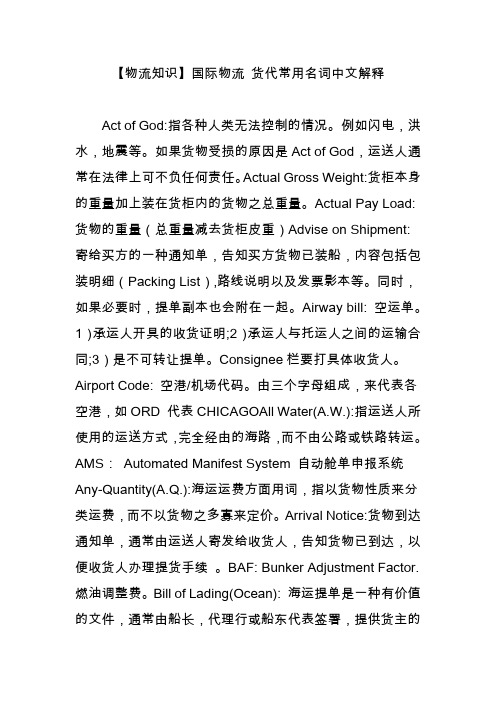
【物流知识】国际物流货代常用名词中文解释Act of God:指各种人类无法控制的情况。
例如闪电,洪水,地震等。
如果货物受损的原因是Act of God,运送人通常在法律上可不负任何责任。
Actual Gross Weight:货柜本身的重量加上装在货柜内的货物之总重量。
Actual Pay Load:货物的重量(总重量减去货柜皮重)Advise on Shipment:寄给买方的一种通知单,告知买方货物已装船,内容包括包装明细(Packing List),路线说明以及发票影本等。
同时,如果必要时,提单副本也会附在一起。
Airway bill: 空运单。
1)承运人开具的收货证明;2)承运人与托运人之间的运输合同;3)是不可转让提单。
Consignee栏要打具体收货人。
Airport Code: 空港/机场代码。
由三个字母组成,来代表各空港,如ORD 代表CHICAGOAll Water(A.W.):指运送人所使用的运送方式,完全经由的海路,而不由公路或铁路转运。
AMS:Automated Manifest System 自动舱单申报系统Any-Quantity(A.Q.):海运运费方面用词,指以货物性质来分类运费,而不以货物之多寡来定价。
Arrival Notice:货物到达通知单,通常由运送人寄发给收货人,告知货物已到达,以便收货人办理提货手续。
BAF: Bunker Adjustment Factor. 燃油调整费。
Bill of Lading(Ocean): 海运提单是一种有价值的文件,通常由船长,代理行或船东代表签署,提供货主的一种票据;证明货物的品类,数量,装上船的日期,目的地以及所经港口等。
海运提单不但是一种货物的收据,也是一种正式的运送合约。
提单本身也具有流通性。
Clean B/L: 当运送人未在提单上注明该货物的包装以及内品之任何缺点时,我们可以称此提单为清洁提单。
Straight B/L:此种提单直接将收货人填在收货人栏内,而不以银行为收货人,因此此种提单不得押汇。
商法名词翻译
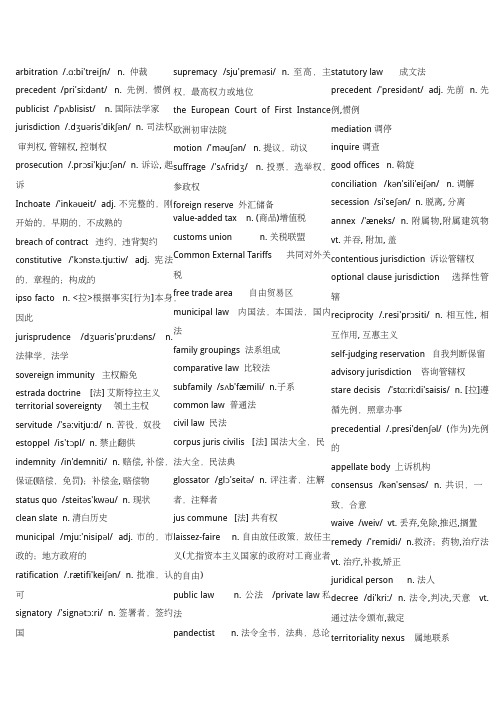
arbitration /.:bi'trei n/ n. ɑʃ仲裁precedent /pri'si:d nt/ n. ə先例,惯例publicist /'p blisist/ n. ʌ国际法学家jurisdiction /.d u ris'dik n/ n. ʒəʃə司法权 审判权, 管辖权, 控制权prosecution /.pr si'kju:n/ n. ɔʃə诉讼, 起诉Inchoate /'ink ueit/ adj. ə不完整的,刚开始的,早期的,不成熟的breach of contract 违约,违背契约constitutive /'k nst .tju:tiv/ adj. ɔə宪法的,章程的;构成的ipso facto n. <拉>根据事实[行为]本身,因此jurisprudence /d u ris'pru:d ns/ n.ʒəə法律学,法学sovereign immunity 主权豁免estrada doctrine [法] 艾斯特拉主义territorial sovereignty 领土主权servitude /'s :vitju:d/ n. ə苦役,奴役estoppel /is't pl/ n. ɔ禁止翻供indemnity /in'demniti/ n. 赔偿, 补偿,保证(赔偿,免罚);补偿金, 赔偿物status quo /steit s'kw u/ n. əə现状clean slate n. 清白历史municipal /mju:'nisip l/ adj. ə市的,市政的;地方政府的ratification /.rætifi'kei n/ n. ʃə批准,认可signatory /'sign t :ri/ n. əɔ签署者,签约国supremacy /sju'prem si/ n. ə至高,主权,最高权力或地位the European Court of First Instance 欧洲初审法院motion /'m u n/ n. əʃə提议,动议suffrage /'s frid / n. ʌʒ投票,选举权,参政权foreign reserve 外汇储备value-added tax n. (商品)增值税customs union n. 关税联盟Common External Tariffs 共同对外关税free trade area 自由贸易区municipal law 内国法,本国法,国内法family groupings 法系组成comparative law 比较法subfamily /s b'fæmili/ n.ʌ子系common law 普通法 civil law 民法corpus juris civilis [法] 国法大全,民法大全,民法典glossator /gl 'seit / n. ɔə评注者,注解者,注释者jus commune [法] 共有权laissez-faire n. 自由放任政策,放任主义(尤指资本主义国家的政府对工商业者的自由)public law n. 公法 /private law 私法pandectist n. 法令全书,法典,总论statutory law 成文法precedent /'presid nt/ adj. ə先前 n. 先例,惯例mediation 调停inquire 调查good offices n. 斡旋conciliation /k n'sili'ei n/ əʃə n. 调解secession /si'se n/ n. ʃə脱离, 分离annex /'æneks/ n. 附属物,附属建筑物vt. 并吞, 附加, 盖contentious jurisdiction 诉讼管辖权optional clause jurisdiction 选择性管辖reciprocity /.resi'pr siti/ n. ɔ相互性, 相互作用, 互惠主义self-judging reservation 自我判断保留advisory jurisdiction 咨询管辖权 stare decisis /'st :ri:di'saisis/ n. [ɑ拉]遵循先例,照章办事precedential /.presi'den l/ (ʃə作为)先例的appellate body 上诉机构consensus /k n'sens s/ n. əə共识,一致,合意waive /weiv/ vt. 丢弃,免除,推迟,搁置 remedy /'remidi/ n.救济;药物,治疗法vt. 治疗,补救,矫正juridical person n. 法人decree /di'kri:/ n. 法令,判决,天意 vt.通过法令颁布,裁定territoriality nexus 属地联系nationality nexus 国籍联系universality nexus 普遍性联系n personam/.inp's unæm/[əə拉] (=against a person)[律]对某人不利, 对人诉讼in rem /in'rem/ [拉](=against a thing) [律]对物(指判决的对象是物或财产)诉讼in personam jurisdiction 对人管辖权domicile /'d misail/ n.ɔ住所premium /'pri:mi m/ n.ə保险费;额外费用;奖金,奖品n. (商)溢价state immunity 国家豁免jure imperii 统治权jure gestionis 管理权tangible property有形财产/ intangible property无形财产intellectual property right 知识产权juridical right 裁判权choice of law 法律选择plaintiff /'pleintif/ n. 原告vesting of right [法] 授与权利vested right 既得权forum non conveniens [法]不方便法院judicial comity [法] 司法礼让anti-suit injunction 禁诉令appellant /'pel nt/ n.əə上诉人 adj.上诉的default judgment [法] 缺席裁判arbitral award 仲裁裁决/公断书impediment /im'pedim nt/ n.ə障碍countervail /'kaunt veil/ v.ə反补贴;偿补偿, 抵销export subsidy 出口津贴most-favored-nation principle 最惠国待遇原则preshipment inspection 装运前检验balance-of-payment 支付平衡waiver /'weiv/ n.ə放弃,弃权,弃权证书expiry /iks'pai ri/ n.ə逾期national treatment rule 国民待遇规则dumping /'d mpiŋ/ n.ʌ倾销subsidization /.s bsidai'zei n/ n.ʌʃə补助补助金free trade area 自由贸易区preferential export 优惠出口tariff /'tærif/ n. 关税, 价目表quota /'kw ut/ n.əə配额,限额,最低票数bound tariff rate 约束税率transparency /træns'pær nsi/ nəharmonized system 协调制度custom union 关税同盟interim /'int rim/ adj.ə中间的,暂时的,临时的escape clause n. 例外条款mandatory ban 强制禁止embargo /em'b:g u/ n.ɑə封港令,禁运禁止(通商sanitary /'sænit ri/ adj.ə卫生的, 清洁的phytosanitary /'fait usænit ri/ adj.əə植物检疫的, 控制植物(尤指农作物)病害的custom valuation code 海关估价守则transaction value 交易价格fallback /'f:lbæk/ n.ɔ后备, 降落物,撤退 adj. 后退的,应变的deductive value (DDV) 扣减价格computed value 计算价格derived value 引伸价格/派生价格local contents requirement 当地含量要求trade-balancing requirement 贸易平衡要求foreign exchange balancingrequirement 外汇平衡要求retardation /.ri:t:'dei n/ n.ɑʃə智力迟钝,阻滞capita /'keip t/ n.əə人均safeguard /'seifg:d/ n.ɑ保障措施 vt.保障customs tariff 关税率/海关税则non-tariff barrier 非关税壁垒freight /freit/ n. 船货,运费,货运vt. 装货,运送,使充满(某种心情或口气)exempt /ig'zempt/ n. 免税者,被免除义务者 adj. 免除的vt. 免除due restraint 适当的克制rules of origin 原产地规则A.United Nations Convention onContracts for the International Sale ofGoods 《联合国国际货物销售合同公约》contracting state 缔约国legality /li'gæliti/ n. 合法, 正当competency /'k mpit nsi/ n.ɔə(行为)能力, 胜任,技能preemption /pri'emp n/ n.ʃə优先;先买(权),先占subjective approach 主观方法objective intent 客观意图subjective intent 主观意图parol evidence rule 证言规则integration clause 并入条款,集成条款pro forma /pr u'f:m/ adj.əɔə形式的,预计的invoice /'inv is/ n.ɔ发票,发货单,货物vt. 开票,寄发票,开清单confirmation /.k nf'mei n/ n.ɔəʃə确认,证实counteroffer /'kaunt:f/ n.əɔə反要约fundamental breach 根本违约choice-of-forum clause 选择法院条款prerequisite /'pri:'rekwizit/ n. 先决条件 adj. 作为前提的, 必备的discretion /di'skre n/ n.ʃə谨慎,判断力,个人选择,选择的自由incoterms abbr. 国际贸易术语解释通则(=International Chamber of Commerce Terms)transshipment /'træns ipm nt/ n.ʃə转运in-transit 在途(中)nachfrist notice 延期通知nonconformity /.n nk n'f:miti/ n.ɔəɔ不符,不合格ratio /'rei i u/ n.ʃə比,比率installment contract 分期付款合同/分期分批履行的合同anticipatory avoidance 预期宣告合同无效good faith善意,诚信substitute /'s bstitju:t/ n.ʌ代替者, 代用品Excuses for Nonperformance 免责事由impediment /im'pedim nt/ n.ə障碍trade term 贸易术语,交货条件unitization n. 统一化(单元化)short sea 近海free on board 船上交货,离岸价格custody /'k st di/ n.ʌə监管,监护,拘留,监禁,羁押waybill /'weibil/ n. 运货单lighterage /'lait rid/ n.əʒ驳运, 驳运费wharfage /'(h)w:fid/ n.ɔʒ码头的使用费,码头的使用,码头业务bill of lading 提单customhouse n. 海关freight forwarders 货运代理broker /'br uk/ n.əə经纪人 vt. 安排,协商(协议的细节,尤指在两国间)consignment /k n'sainm nt/ n.(əə货物的)交托, 交货, 发货, 运送, 托付物consignee /k nsai'ni:/ n.ɔ收货人consignor /k n'sain/ n.əə发货人liability /.lai'biliti/ n.ə责任,债务surcharge /'s:.t:d/ n.əʃɑʒ额外费charterparty n. 租船合同common carriage 公共运输conference line 协会货轮independent line 独立货轮tramp vessel 不定期货船rebate /'ri:beit/ n. 回扣 vt. 减少,变钝clean bill of lading 清洁提单claused bill of lading 不清洁提单discrepancy /dis'krep nsi/ n.ə相差,差异,差别endorse /in'd:s/ vt.ɔ背书于,支持,赞同notation /n u'tei n/ n.əʃə记号法,表示法,注释shipper /'ip/ n.ʃə托运人carrier /'kæri/ n.ə承运人straight bill 记名提单order bill 指示提单bona fide /'b un'faidi/ adj.əə真诚的, 无欺的,名副其实的customary freight unit 习惯运费单位voyage charterparty 航程租赁合同/航次租赁合同dead freight n. 空舱费lay day n. 装卸日期demurrage /di'm rid/ n.ʌʒ滞期,滞期费discharge /dis't:d/ʃɑʒ卸货charterer 租船人,承租人 /shipowner船东time charterparty 定期租船合同maritime lien 海上留置权foreclosure /f:'kl u/ n.ɔəʒə没收salvage /'sælvid/ n.ʒ海上救助,打捞,抢救vt. 海上救助,打捞,抢救average clause 海损条款/分摊条款constructive total loss clause 推定全损条款particular average 单独海损general average 共同海损with average policy 海损保险单franchise clause 保险免赔率条款/特许责任条款underwriting /'ʌnd.raitiŋə/ n. 承销,保险业promissory note n. 本票drawee /drɔ:'i:/ n. 受票人,付款人uniform commercial code 统一商法法典endorser /in'dɔ:s/ n.ə背书人,转让人endorsee /.endɔ:'si:/ n. 被背书人,被转让人, 承受票据的人bearer /'bɛər/ n.ə持票人,带信人,承担人maturity /m'tju riti/ n. (əə支票等的)到期assignee /.æsai'ni:/ n. 受让人assignor n. 让与人bearer paper 无记名票据blank endorsement 不记名背书/空白背书qualified endorsement 附条件背书/限制背书/无追索权背书/修改性背书restrictive endorsement 限制性背书conditional endorsement 附条件背书special endorsement 特别背书/记名背书dishonor /dis'ɔn/ n.ə拒付,不名誉,羞辱bad faith adj. 不诚实(背信弃义) gross negligence 重大过失/严重过失holder in due course 正当持票人notary /'n ut ri/ n.əə公证人, 公证员documentary credit 跟单信用证banker's credit 银行信贷account party 开证申请人issuing bank n. 开证银行advising bank n. 通知银行beneficiary /.beni'fiʃəri/ n. 受益人sight bill n. [经]即期票据, 见票即付票据time bill n. 远期汇票debit /'debit/ n. 借方,借,借项,缺点 vt.记入借方sight payment 见票付款confirming bank 保兑银行rule of strict compliance 严格相符规则swap /swɔp/ n. 交换 vt. &vi. 交换,用...作交易。
物流专业术语和常用术语

A d v a n c e dB / L ? ??预借提单A n t i - d a t eB / L 倒签提单B r o k e n s p a c e 空舱位b u l k 散货C a r g o r e c e i p t 货物收据Carrier Owned Container (COC) 船方的自备箱C h a r g e a b l e w e i g h t 计费重量C l o s i n gD a t e 截关日c o n v e n t i o n a l v e s s e l 散货船credit贷方。
在我司开具Credit Note时,意思是我们给对方钱。
debit借方。
在我司开具Debit Note时,意思是我们向对方要钱。
duty关税Export declaration E/D出口申报单Feeder Vessel/Lighter驳船航次饲给船集散船Free zone外贸免税区frequency船(航)期General Trading一般贸易商品编码Import entry进口报关单Inland haulage charge内陆拖车费inspection查验Letter of guarantee(L/G)保函Mother Vessel 主线船C u s t o m s f o r m a l i t i e s 海关手续Pre-alert预报,一般用于空运Shipping advice / Sailing advice 预报,一般用C u s t o m s f r e e d e p o t 海关免税仓库于海运Post-date B/L 顺签提单C u s t o m s v a l u a t i o n 海关估价Processing with supplied 来料加工C u s t o m s d r a w b a c k 海关退货Processing with imported 进料加工quota 配额d e p o s i t 保证金QUAY (QUAI ) FEE 港杂费(适用于拼箱)SOC 货主自备箱(集装箱)Dem---demurrage 疏港费。
外贸出口费用常用英文

外贸出口费用常用英文外貿出口費用常用英文海运费 ocean freight集卡运费、短驳费 Drayage订舱费 booking charge报关费 customs clearance fee 操作劳务费 labor fee or handling charge 商检换单费 exchange fee for CIP 换单费 D/O fee拆箱费 De-vanning charge港杂费 port sur-charge电放费 B/L surrender fee冲关费 emergent deceleration charge 海关查验费 customs inspectionfee 待时费 waiting charge仓储费 storage fee改单费 amendment charge拼箱服务费 LCL service charge动、植检疫费 animal & plant quarantine fee移动式其重机费 mobile crane charge 进出库费 warehouse in/out charge 提箱费 container stuffing charge 滞期费 demurrage charge 滞箱费 container detention charge 卡车运费 cartage fee商检费 commodity inspection fee 转运费 transportation charge 污箱费container dirtyness change 坏箱费用 container damage charge 清洁箱费container clearance charge 分拨费 dispatch charge车上交货 FOT ( free on track ) 电汇手续费 T/T fee转境费/过境费 I/E bonded charge 空运方面的专用术语空运费 air freight机场费 air terminal charge空运提单费 airway bill feeFSC (燃油附加费) fuel surchargeSCC(安全附加费) security sur-charge 抽单费 D/O fee上海港常用术语内装箱费 container loading charge(including inland drayage) 疏港费 port congestion charge 他港常用术语场站费 CFS charge文件费 document chargeAMS Automated Manifest System 自运舱单系统ACS/ACC ALAMEDA CORRIDOR SURCHARGE 火车通道费(自洛杉矶转运) BAF BUNKER AJUSTMENT FACTOR 燃油附加费系数 BAF 燃油附加费,大多数航线都有,但标准不一。
- 1、下载文档前请自行甄别文档内容的完整性,平台不提供额外的编辑、内容补充、找答案等附加服务。
- 2、"仅部分预览"的文档,不可在线预览部分如存在完整性等问题,可反馈申请退款(可完整预览的文档不适用该条件!)。
- 3、如文档侵犯您的权益,请联系客服反馈,我们会尽快为您处理(人工客服工作时间:9:00-18:30)。
Chapter 16DemurrageDemurrage7.Demurrage 101Ten running days on demurrage at the rate stated in Box 18 per 102 day or pro rata for any part of a day, payable day by day, to be 103 allowed Merchants altogether at ports of loading and discharging. 10416.1As with laytime, the Lloyd’s Shipping Law Library contains a specialist work on demurrage,1 to which reference should be made for a full treatment of the subject.General16.2If the vessel is detained in loading or discharging beyond the agreed laytime, the charterer is in breach of charter and the suggestion to the contrary implicit in the word “allowed” does not alter this analysis. The charterer’s liability may sound in damages at large or, where a demurrage rate is agreed, in demurrage, which is liquidated damages for that breach. Viscount Finlay stated the principle in William Alexander v. Akt. Hansa2:“If the charterer has agreed to load or unload within a fixed period of time … he is answerable for the non-performance of that engagement, whatever the nature of the impediments, unless they are covered by exceptions in the charterparty or arise through the fault of the shipowner or those for whom he is responsible.”The liability is absolute, subject to the two matters mentioned by Lord Finlay, and not dependent upon fault on the part of the charterer. This is so even where the Hague Rules are incorporated, Article IV rule 3 of which provides that: “The shipper shall not be respo nsible for loss or damage sustained by the carrier or the ship arising or resulting from any cause without the act, fault, or neglect of the shipper, his agent or servants”.3 Even where a clause does specifically require delay due to“charterer’s fault” in order to trigger the liability to pay demurrage, it seems that the mere fact of the laytime being exceeded is a sufficient fault, in the sense of breach of contract, by the charterer.4Exceptions clauses—“once on demurrage always on demurrage”16.3 Exceptions clauses must be clearly worded to lessen or exclude a liability for demurrage once there has been a failure to load or discharge, as appropriate, within the allowed laytime. Lord Reid treated as correct the proposition that once a vessel is on demurrage no exceptions or interruptions will operate to prevent demurrage continuing to be payable unless the clause is clearly worded to have that effect.5This is often, but sometimes perhaps misleadingly, abbreviated to the phrase “once on demurrage, always on demurrage”. The rule probably owes its origin, at any rate in part, to the consideration that, if the charterer had performed his undertaking to load or discharge in the laydays, the vessel would not have been affected by occurrences causing delay during the demurrage period. As Lord Reid put it in The Spalmatori,6 a case concerning the Centrocon Strike Clause:“I do not think it is an arbitrary rule for this reason. If a strike occurs before the end of the laytime neither party can be blamed in any way. But if it occurs after demurrage has begun to accrue the owner might well say: true, your breach of contract in detaining my ship after the end of the laytime did not cause the strike, but if you had fulfilled your contract the strike would have caused no loss because my ship would have been on the high seas before it began: so it is more reasonable that you should bear the loss than that I should.”However, the rule has been applied frequently in cases where no such considerations exist, and where the interruption or delay in question was an ordinary incident of the voyage, such as shifting7 or fumigating,8 which would have occurred anyway, whether the laydays had been exceeded or not. It has also been held that, where laytime is reversible and the vessel is already on demurrage when she arrives at the discharging port no notice of readiness need be given, demurrage will continue to accrue as soon as the vessel has arrived and is ready to unload, and the charter accordingly loses the benefit of any free period provided for in the charter between the giving of notice and the commencement of time.916.4There is no absolute requirement of law that, if an exceptions clause is to apply to time on demurrage, it must expressly so stipulate,10 butin principle generally worded exceptions clauses will not have that effect, and in the absence of an express reference the clarity of the clause must be very great. There is, in fact, only one reported case in which an exceptions clause not referring expressly to demurrage has been held to apply to events after the laytime was exceeded.11Delay caused by the fault of the shipowner16.5 One exception which does apply equally to laytime or to time on demurrage is the implied exception of delay caused by the fault of the owner or of those for whom he is responsible. The nature of this exception has already been discussed in connection with laytime.12 Where the owner’s fault delays or impedes cargo operations but does not deprive the charterer of access to the vessel or cargo, it is clear that the onus lies on the charterer to prove how much delay was actually caused by the fault.13 But whe n the owner’s conduct results in the charterer being deprived of the use of the ship the burden is on the owner to prove that no delay resulted from his action. Moreover, where the owner is using the ship for his own purposes, unconnected with the loading or discharging operation, it may be that demurrage will not accrue even if no delay has resulted, on the grounds that demurrage, being liquidated damages for detention, cannot be claimed in respect of a period in which the ship is not being detained.14Demurrage and mitigation16.6Since demurrage is liquidated damages, almost invariably payable ata fixed rate per day and pro rata, there can be no question of the owner being under any duty to mitigate damages15 by making efforts to reduce his daily loss resulting from the detention, since the agreed rate per day will apply whatever may be the actual loss. However, the owner may be required to take reasonable steps to ensure that the period of detention of his ship is not unnecessarily prolonged by any failure on his part to act reasonably, and the decided cases appear to recognise a duty to mitigate in this fairly limited respect. It may also be that it is, in effect, recognised in the situation where the vessel performs other functions for the account of the owner at a time when she is and would inevitably be waiting to load or unload under the relevant charter.1616.7 The situation in which an owner is most frequently accused of a failure to mitigate is where the discharge of the cargo is delayed by theexercise of a lien. Prima facie it is no answer to a claim for demurrage that discharge was delayed by the lawful exercise of a lien. However, if the exercise of the lien was wholly unreasonable in the circumstances, for example, if it should have been obvious to the owner that he could have secured his claim equally well, at a saving in cost and with no extra inconvenience to himself, by discharging the cargo under lien, he may be held to have failed to mitigate. Such cases are likely to be rare.The Cape Wrath was delayed at the discharging port due to the owners’ exercising a lien for demurrage at the loading port. The precise amount was in dispute between the parties and there were lengthy negotiations which resulted in the provision of security for the owners’ claim to be determined later. Discharging was halted for four days during these negotiations. There was evidence that if the vessel had discharged the cargo liened into a warehouse under the Merchant Shipping Act, there would have been a minimum charge of 20 days’ rent. The owners claimed damages for detention during the period when discharging had ceased.Bigham J. held they were entitled to recover damages for detention because he considered that they had exercised the lien in a reasonable manner. He said this of the owners’ claim: “This depends, in my opinion, upon whether they exercised their lien in a reasonable manner. If it was the cheaper course to keep the cargo on board the ship, rather than to warehouse it under the Merchant Shipping Act, then they acted reasonably in keeping it on board. If, on the other hand, it would have been cheaper to put the cargo into warehouse then they acted unreasonably in keeping it on board … [After referring to Moller v. Jecks (1865) 19 C.B.(N.S.) 332, he continued:] … it was held that damages could not be recovered for detention caused by [the master’s] own unreasonable exercise of what may have been his strict legal right …”(Lyle Shipping Co. v. Cardiff Corporation (1899) 5 Com. Cas. 87 at page 97.)16.8 If anything, the test adopted by Bigham J., involving as it does a simple comparison of the cost of exercising the lien on shore or on board, is too rigorous, for the situation at the time is often less than clear cut, and there may be other factors to be taken into account, such as whether the exercise of the lien ashore could be guaranteed to be as valid as its exercise on board, and whether the owner would have an equally effective remedy to recover the costs involved. In Smailes v. Hans Dessen,17 another case in which it was argued that owner had failed to mitigate by discharging the cargo under lien, the Court of Appeal, whilst accepting that in principle the doctrine of mitigation applied to ademurrage claim, adopted a less rigorous approach, and Cozens Hardy L.J. pointed out:“They are bound to act reasonably. Reasonableness begins at home; a shipowner has a right to look at his own interests before he considers how far he can mitigate damages imposed on another person. A plaintiff is not bound to jeopardise any of his own rights in the hope of mitigating damages that may be payable by his opponent.”Thus, the reas onableness or otherwise of the owner’s conduct is to be determined by reference to what was reasonable for a person in his position to do bearing in mind his own interests as having priority over those of the receiver or charterer.16.9 Another illustration of the application to demurrage of ordinary principles of mitigation is that where the owner does take steps, going beyond his legal obligations, to diminish the time his vessel spends on demurrage he is entitled to recover any costs reasonably incurred in so doing. In Leeds SS. Co. v. Duncan Fox18 it was held that an overtime payment to stevedores was recoverable on this ground.16.10Some contracts of carriage by sea, more frequently bills of lading than charterparties, provide that the receiver shall receive the goods as fast as the ship can deliver, failing which the owner shall be entitled to land and store the goods at the consignee’s expense. A clause of this nature is for the owner’s benefit, and does not exclud e his right to lien the goods on board and to claim in respect of the detention of the ship,19 provided that it is not unreasonable for him to adopt this course.Demurrage and damages for detention16.11The demurrage clause in the Gencon 1976 form is rarely left intact in modern charters. It provides for only 10 running days on demurrage. It is only that period during which the damages for delay in loading or discharging are liquidated at the rate stipulated in the charterparty. Once that period has passed, the owner is entitled not to demurrage but to damages for detention at large. Those damages will be such as to compensate the owner for his actual loss, subject to the ordinary rules of remoteness and causation,20 and may be greater or less than the demurrage rate, but the burden of proving his loss lies on the owner. It is the potential for a claim for damages for detention at large which explains the insertion of those words in the lien clause, so that the owner has a lien for damages at large as well as demurrage.16.12 By contrast with the Gencon 1976 form, the great majority of charterparties impose no express limit on the period of demurrage.21 In those circumstances the demurrage rate applies throughout the entire period of detention, and the owner is not entitled to claim damages at large after the expiry of a reasonable time on demurrage.The Inverkip was chartered to load grain at New Orleans or Galveston and was ordered to Galveston, but before she arrived there it was struck by a tidal wave and, with the agreement of the owner, the charterer redirected her to load at Newport News, where she was delayed beyond the agreed laydays for loading because of the difficulty in obtaining a substitute cargo as well as other causes. The owner claimed damages for detention at large for the delay in obtaining a substitute cargo on the grounds, first, that the agreed demurrage rate only applied during a “reasonable” period of detention beyond the laydays, and, secondly, that it only applied to delay in loading as such, and not to the breach of the separate obligation to provide a cargo.The Court of Appeal rejected both these arguments and held that the cha rterer’s sole liability was to pay demurrage at the agreed rate. In the absence of stipulation to the contrary the agreed rate of demurrage applied without limit of time, until the delay was such as to frustrate the contract, or the owner was entitled to and did treat the charterer as having repudiated the contract. The fact that the charterer may also have been in breach of the separate obligation to provide cargo was immaterial, since the only loss caused to the owner by that breach was the delay in loading, and the agreed demurrage rate applied to all such delay, whether it resulted merely from the failure to load within the laydays, or from breach of some separate obligation.(Inverkip Steamship Co. v. Bunge [1917] 2 K.B. 193.)Thus, in the absence of a stipulation limiting the time on demurrage, and questions of frustration and repudiation apart, demurrage at the agreed rate accrues continuously until the completion of the functions that would have stopped laytime running.22 The corollary is that the provision for demurrage will normally prevent the owner from treating the charter as terminable for breach of duty to load in the laytime alone, and he must wait until the delay is sufficient, or it is clear that it is bound to become sufficient, to frustrate the adventure, or the charterer renounces the charter.23 It is arguable that clause 7, by fixing the time on demurrage as 10 days, produces a different result, and entitles the owner to terminate the charter after the expiry of the 10 days. However, it is unlikely that the provision would be interpreted as having this effect.16.13The second point of general importance decided in Inverkip Steamship Co.v. Bunge is that the demurrage provisions of the charter apply to all situations where the loss suffered by the owner is a detention of the ship by reason of a failure to load or discharge within the laydays, and it matters not that the charterer may have been in breach of some other obligation, so long as that breach resulted in no other kind of loss. This principle has been applied in Chandris v. Isbrandtsen-Moller,24where the charterer loaded dangerous cargo in breach of the charter, and The Delian Spirit,25 where the charterer failed to indicate a berth reachable on arrival. In both cases the only consequence was a failure to load or unload within the laydays, and it was held that the situation was governed by the laytime and the demurrage provisions of the charter, with demurrage payable at the agreed rate after the expiry of laytime. So long as the relevant period of delay is covered by the agreement as to demurrage, the owner is limited to a claim for demurrage even where the delay is deliberately caused, unless and until he justifiably terminates the charter on the ground of repudiation. The exclusivity of demurrage as a remedy may be of importance where, for example, there is a string of charterparties containing arbitration clauses; unlike courts, arbitrators have no inherent power to order that a party to one arbitration within the string should pay any costs incurred in another arbitration likewise within the string but an arbitrator can award costs as damages, where otherwise appropriate. Where the liability of a party is solely for demurrage it will not normally be possible to make such an award.2616.14 Where, however, in addition to the failure to load or discharge within the laytime, there is a further obligation which has been broken causing additional loss, then the owner is not necessarily restricted to his claim for demurrage.The Sagatind was chartered to load a full and complete cargo of timber at Archangel at a freight referable to the quantity loaded. The loading took longer than the agreed laydays and was therefore completed during the winter season, which meant that the vessel was permitted only to load to her winter marks. A “full and complete cargo” was less than it would have been if the vessel had loaded within the laydays and so the owner received less freight. They claimed their lost freight from the charterer who argued that, because the loss resulted from the delay in loading, their liability was limited to the demurrage payable under the charter.The Court of Appeal held that the owner was entitled to recover the lost freight. Atkin L.J. said (at page 363): “The provisions as to demurrage quantify the damages, not for the complete breach, but only such damages as result from the detention of the vessel. For correlative to the ship’s right to receive the agreed damages is the charterer’s right to detainthe ship for the purpose of enabling him, if possible, to perform his broken contract and so mitigate any further damage. If, however, for reasons other than the shipowner’s default, the charterer becomes unable to do that which he contracted to do—namely, put a full and complete cargo on board during the fixed laydays, the breach is never repaired, the damages are not completely mitigated and the shipowner may recover the loss which he has incurred in addition to his liquidated demurrage …”Sargant L.J. thought that the breach of charter in failing to load what was a full and complete cargo as ascertained at the date of the vessel’s arrival at Archangel was a breach which was distinct from mere delay. Bankes L.J., while agreeing in the result, seems to have thought also that the existence of the demurrage agreement did not exclude the additional claim for special damage.(Akt. Reidar v. Arcos[1927] 1 K.B. 352, discussed in Total Transport Corp. v. Amoco Trading (The Altus)[1985] 1 Lloyd’s Rep. 423and The Bonde[1991] 1 Lloyd’s Rep. 136.)16.15There may also be cases of pure delay, caused by the charterer’s breach of a term of the charter, which are not governed by the laytime and demurrage provisions because the delay occurs before the commencement of laytime, or after the completion of loading or, less probably in practice, after completion of discharging. Some examples are:∙(1) failure to nominate a loading port punctually;∙(2) preventing the vessel from becoming an arrived ship, for example, by failure to have cargo available27or, where the charter so requires, by failure to provide equipmentnecessary for loading28 or failure to indicate a berth reachable on arrival29; and ∙(3) delay in nominating the discharging port, or in presenting bills of lading for signature.30It is, of course, perfectly possible for the charter to contain express provisions which bring these situations within the laytime and demurrage regime, or which provide that liquidated damages shall be payable at the demurrage rate or some other rate. The “time lost in waiting for berth” provision of the Gencon charter is an example of the former, although it is not dependent on breach. Charterers are not generally responsible for the acts of receivers after discharge, such as acts of preventing departure or arresting the vessel as security for cargo claims.31When demurrage falls due16.16Demurrage under the clause is payable “day by day”, so that the owner has an accrued and enforceable cause of action for demurrage at the end of every day. Once again, this is important for the purposes of the lien clause. It may, however, be displaced by a special agreement postponing the time for payment.32The words “pro rata for any part of a day” exclude the rule that, if any part of a day is used, a full day’s demurrage falls due.3316.17For the meaning of “running days”, see the commentary on clause 6.34Who is liable to pay demurrage?16.18 The clause does not specify who is to pay demurrage. Clearly the charterer is liable, save to the extent that he is protected by the provisions of the lien clause.3516.19When the Gencon charterparty, with this clause more or less intact, is incorporated into a bill of lading, it seems to be the case that the bill of lading holders are liable for demurrage incurred at both loading and discharging ports. In The Miramar,36where the charter stipulated that the “charterer” wa s to pay demurrage, the House of Lords held that liability for charterparty demurrage was not imposed on the holder of a bill of lading which incorporated the terms of the charter. However, in spite of the very wide-ranging explanations for holding that the bill of lading holder in that case was not liable for demurrage, the House of Lords did not overrule Porteus v. Watney,37 where the bill of lading holders were held liable for demurrage by reason of the incorporation into the bills of lading of a charter which did not specify the “charterer” as the party responsible for paying demurrage. The language of clause 7, with its reference to “Merchants”, if anything reinforces this conclusion. The word is certainly wide enough to include bill of lading holders, and although the clause does not expressly provide that the “Merchants” are liable for demurrage, it does provide an indication that the payment of demurrage will be the concern of persons other than the charterer.16.20The word “altogether” is inserted apparently so that the owner cannot recover demurrage at the charterparty rate from each and all of the bill of lading holders. The question whether, in the absence of such a provision, the charterparty demurrage could be recovered from all the bill of lading holders, it being no defence that payment had already been made by another bill of lading holder, provoked a divergence of view in Porteus v. Watney. It is submitted that the better view is that, whilst the effect of the charterparty incorporation clause in the bill of ladingis to make each bill of lading holder jointly and severally liable for the whole amount of the demurrage calculated in accordance with the provisions of the charterparty, as was held in Porteus v. Watney, there is only a single sum due to the owner in respect of that demurrage, and a payment by any bill of lading holder, or by the charterer himself, discharges the others to the extent of the payment.American Law16.27Once the allowed laytime (“free time”) expires, the charterer becomes liable for demurrage (“extended freight”) in the amount (usually based on a daily rate) agreed in the charter for all additional time that the vessel is delayed beyond laytime. Absent a specific clause to the contrary by which laytime exceptions are to apply to time on demurrage, once the vessel is on demurrage, “the rule is that…it will not be suspended by the occurrence of an event within the exceptions of the loading clause”.38This rule is often stated as, “Once on demurrage, always on demurrage”.16.28The underlying premise of this rule is that but for the charterer’s failure to complete loading and/or discharging within the allowed laytime, the subsequently arising event would not have caused the vessel any further delay; therefore, the charterer should not be entitled in such a case to the benefit of the exception. “All delays after [the date the vessel went on demurrage] were the result of the negligence of the [charterer] a nd whether it ‘rained or shined’, was Sunday or a weekday, he should pay demurrage for every day thereafter, until the ship was discharged.”39Similarly, if the vessel arrives at a port “on demurrage”, the charterer is not entitled to the benefit of any “notice time” (e.g., between arrival and “next working period”), absent a clause to the contrary.4016.29 Once the vessel is on demurrage, the occurrence of a delay due to an event covered by a general exception to laytime or a vis major event does not interrupt time on demurrage.41 If such time is to be excepted from time on demurrage, the charter must say so explicitly.42A “general exceptions” clause alone is insufficient.4316.30With respect to the non-contractual exception of fault of the owner, however, the rationale behind the rule does not apply. In the usual case at least, a charterer’s failure to complete loading/discharging within the allowed laytime has no connection with, for example, a subsequent additional delay caused by a crane breakdown. That is, while a charterer’s failure to load/discharge the cargo within the a llowedlaytime necessarily exposes the vessel to various risks to which she would not have been exposed had charterer complied with the laytime provisions, a subsequently arising fault of the owner causing additional delay is normally not such a risk.44 But see The Danita.45 In any event, under general principles, it should be the charterer’s burden to prove not only the fault itself but that such fault increased the delay.How and when payable16.31Clause 7 of the 1976 and 1994 Gencon forms make clear that demurrage is payable “per day or pro rata for any part of a day”. Without such language, any time used on a day on which the vessel is otherwise on demurrage causes the entire day to count.4616.32Clause 7 of the 1976 form also provides that demurrage is “payable day by day”. This allows the owner to demand payment for each day the vessel is on demurrage and thereby allows him an opportunity to assert his lien on the goods under clause 8 as discharge is taking place.4716.33Clause 7 of the Gencon 1994 form provides that demurrage “shall fall due day by day and shall be payable upon receipt of the Owners’ invoic e.” The 1994 form also provides: “In the event the demurrage is not paid in accordance with the above, the Owner shall give the Charterers 96 running hours written notice to rectify the failure. If the demurrage is not paid at the expiration of this time limit and if the vessel is in or at the loading port, the Owners are entitled at any time to terminate the Charter Party and claim damages for any losses caused thereby.”Demurrage contrasted with “damages for detention” or “detention”16.34 Clause 7 of the 1976 Gencon form limits the time on demurrage to “ten running days on demurrage at the contract rate stated in Box 18”; this limitation has been eliminated in the 1994 form. Under this clause, if the vessel is detained longer, the owner is entitled to collect “damages for detention” for such additional time, and clause 8 provides the owner with a lien on the cargo for such damages in addition to demurrage and freight.4816.35Ordinarily, where the number of days on demurrage has been limited and a daily rate has been agreed, the agreed demurrage rate will be adopted for any period of further detention, but, as to this further period ofdetention, either party may prove the actual loss was less or more, either by proving the market rate for the vessel or by proving the daily gross earnings of the vessel less any expenses saved by virtue of the fact that she is lying idle.4916.36 It is rare today, however, that parties agree to limit the number of days the vessel may be on demurrage (sometimes referred to as “contract demurrage”), and, indeed, the 1994 form deleted this provision. Instead, the demurrage rate usually applies to however many days in excess of laytime the vessel takes to load and/or discharge. The question then arises whether the concept of “damages for detention” has any meaning in a typical charter today which allows a fixed period of laytime and contains no limit to the number of days on demurrage. As conceived above, “demurrage” in such a charter would seem to leave no time period to which “damages for detention” could apply.16.37Some arbitrators and courts have, however, found that “damages for detention” can be an alternative remedy for delays during, or after, what otherwise would be laytime and/or that they are not bound to the agreed daily demurrage rate as compensation for such periods. This contention typically arises when the charterer causes a delay in the loading or discharging of the vessel and, but for the breach, the vessel could have otherwise commenced or continued loading or discharging. The owner will contend that while he assumed various risks in agreeing to the method of calculating laytime and the daily rate of demurrage, he did not assume the risk of a delay caused by the charterer’s breach of the charter, especially not an intentional delaying of the vessel for the charterer’s own purposes. The examples range from failing to have a cargo ready when the vessel arrives to delaying the vessel intentionally for use as a storage facility.16.38The question is most likely to arise when the demurrage rate agreed in the charter is less than the market rate for the vessel; if it is the same, or more, the owner is likely to remain content with the agreed rate a nd/or the charterer will not be “tempted” to delay the vessel for his own purposes. The financial consequences are not, however, a function of the agreed daily rate alone; the owner will argue that since the “detention” is not due to a risk covered by the laytime clause, the days should count continuously, i.e., not subject to laytime exceptions. The question of “damages for detention” versus “demurrage” seems to arise a disproportionate number of times in sugar charters, but it is by no means limited to them.16.39 Two schools of thought are evident. On the one hand, there is the view that the parties agreed on a method of calculating laytime (“free。
